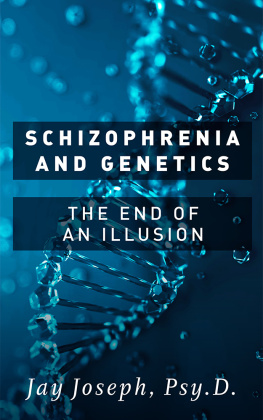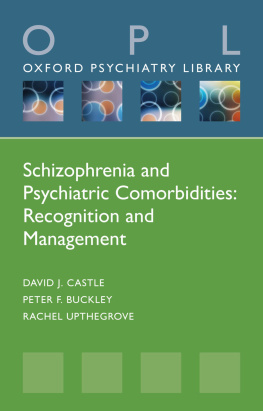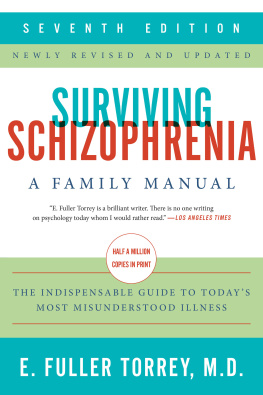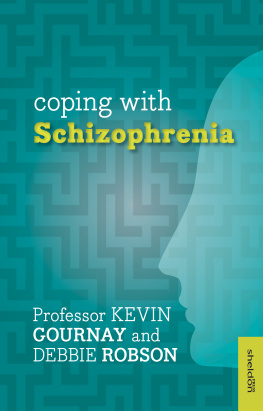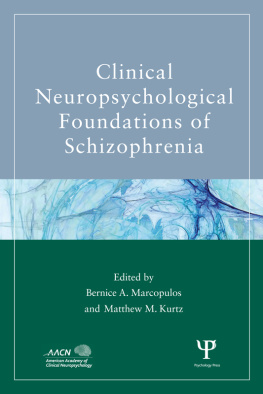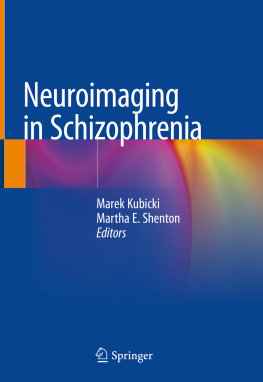SCHIZOPHRENIA
AN INFORMATION GUIDE
A GUIDE FOR PEOPLE
WITH SCHIZOPHRENIA
AND THEIR FAMILIES
JANE PATERSON, MSW, CSW
DALE BUTTERILL, MSW, MPA
CLAUDIA TINDALL, MSW, CSW
DAVID CLODMAN, MSW, CSW
APRIL COLLINS, MSW, CSW
This is a revised version of the
original guide written in 1988 by:
Ann Kerr, MSW, CSW
Ruth Thompson, MSW, CSW
Joel Jeffries, MB, FRCP(C)

Schizophrenia:
A Guide for People with Schizophrenia and Their Families
ISBN: 978-0-88868-335-9 (PRINT)
ISBN: 978-0-88868-561-2 (PDF)
ISBN: 978-0-88868-562-9 (HTML)
Product code: PM009
Printed in Canada
Copyright 1999 Centre for Addiction and Mental Health
No part of this work may be reproduced or transmitted in any form or
by any means electronic or mechanical, including photocopying and
recording, or by any information storage and retrieval system without
written permission from the publisher except for a brief quotation
(not to exceed 200 words) in a review or professional work.
For information on other Centre for Addiction and Mental Health
resource materials or to place an order, please contact:
Publication Services
Centre for Addiction and Mental Health
33 Russell Street
Toronto, Ontario M5S 2S1
Tel: 1 800 661-1111 or 416 595-6059 in Toronto
E-mail: publications@camh.net
Web site: www.camh.net
Disponible en franais sous le titre
La schizophrnie : Guide lintention des personnes atteintes
de schizophrnie et de leur famille
CONTENTS
ACKNOWLEDGMENT
We would like to thank those who were treated at the Clarke Institute of Psychiatry (one of the founding partners of the Centre for Addiction and Mental Health), and their families, for their questions, suggestions and comments on earlier versions of this guide. Also, our thanks are extended to the many Centre staff who were instrumental in producing this guide.
INTRODUCTION
This guide is written for people with schizophrenia, their families and partners, and those who want a basic understanding of this illness. It is not a substitute for treatment from a physician, but it can be used as a basis for questions and discussion about schizophrenia.
1 WHAT IS SCHIZOPHRENIA?
I thought space aliens were after me. I didnt dare leave my room and covered all my windows with aluminum foil to keep them out. I refused to eat because I thought the food was poisoned.
The young woman quoted above has schizophrenia. She truly believed her delusion. No one could convince her otherwise. Not all people with schizophrenia will have the same type of experience as this womans, but they will have some disturbances in thinking, feeling and relating to others.
At least one person in 100 can be expected to develop schizophrenia. Men and women are affected equally; however, men tend to experience their first episode in their late teens or early 20s. With women, the onset is usually a few years later.
HOW DOES SCHIZOPHRENIA BEGIN AND WHAT IS ITS COURSE?
In most cases, schizophrenia can start so gradually that people experiencing symptoms, and their families, may not be aware of the illness for a long time. In some cases, however, the onset may be more rapid.
PHASES OF SCHIZOPHRENIA
There are three phases of schizophrenia prodromal (or beginning), active, and residual. They tend to occur in sequence and appear in cycles throughout the course of the illness.
PRODROMAL PHASE
When symptoms develop gradually, people may begin to lose interest in their usual pursuits and to withdraw from friends and family members. They may become easily confused, have trouble concentrating, and feel listless and apathetic, preferring to spend most of their days alone. They may also become intensely preoccupied with religion or philosophy. Family and friends may be upset with this behaviour, believing the person is lazy rather than ill. Occasionally, these symptoms reach a plateau and do not develop further but, in most cases, an active phase of the illness follows. The prodromal period can last weeks or months.
Although the symptoms described above are typical of the prodromal phase of schizophrenia, they may also be due to other causes. If these symptoms are present, they should be discussed with a doctor.
ACTIVE PHASE
During schizophrenias active phase, people may experience delusions, hallucinations, marked distortions in thinking and disturbances in behaviour and feelings. This phase most often appears after a prodromal period. On occasion, these symptoms can appear suddenly.
RESIDUAL PHASE
After an active phase, people may be listless, have trouble concentrating and be withdrawn. The symptoms in this phase are similar to those outlined under the prodromal phase. If there have been no symptoms before the first episode, few or no symptoms may be experienced afterward. During a lifetime, people with schizophrenia may become actively ill once or twice, or have many more episodes. Unfortunately, residual symptoms may increase, while ability to function normally may decrease, after each active phase. It is therefore important to try to avoid relapses by following the prescribed treatment. Currently it is difficult to predict at the onset how fully a person will recover.
WHAT ARE THE SYMPTOMS OF SCHIZOPHRENIA?
When I first start becoming ill I lose my perspective on the things I hold important, such as courtesy toward my co-workers and roommate.
When Im ill lights are brighter, halls are longer and narrower, walls look like paper and colours are much more vivid. I see faces in the patterns of the rug which begin to have special meaning for me. If Im lucky and my medication is increased, the symptoms may end here.
Sometimes I feel like my arms and legs are disconnected from my body and that my body is disintegrating. Im terrified to have a bath, because Im afraid I will disintegrate and float down the drain. Sometimes Im afraid that Ill fall apart if I take my clothes off.
three first-hand accounts of various symptoms experienced
by people with schizophrenia.
The symptoms of schizophrenia fall into two categories positive and negative symptoms. The positive, or psychotic, symptoms most often associated with schizophrenia include delusions, hallucinations and grossly disorganized thought, mood and behaviour. Positive symptoms appear during active phases of the disorder. Negative symptoms deficits in attention, memory, fluency of thought and language, emotional expression, judgment, decision-making and motivation can be more persistent. These negative symptoms can lead to patterns of social withdrawal and alienation that may disrupt the persons ability to work and function normally.
People with schizophrenia will likely have one or more of the symptoms mentioned below. However, some of these symptoms are not unique to schizophrenia. It is always necessary to see a doctor for diagnosis.
POSITIVE SYMPTOMS
At some phase of the illness, schizophrenia always involves delusions, hallucinations, disturbances in thinking, or disorganized behaviour.
DELUSIONS
Delusions are fixed, false beliefs that are not consistent with the persons culture, and have no basis in fact. Delusions may cause people to believe that their bodies or thoughts are being controlled by outside forces, that ordinary events have special meaning for them, that they are especially important or have unusual powers, or that their bodies have changed in some mysterious way. A common delusion experienced by people with schizophrenia is the belief that people are trying to harm them.



